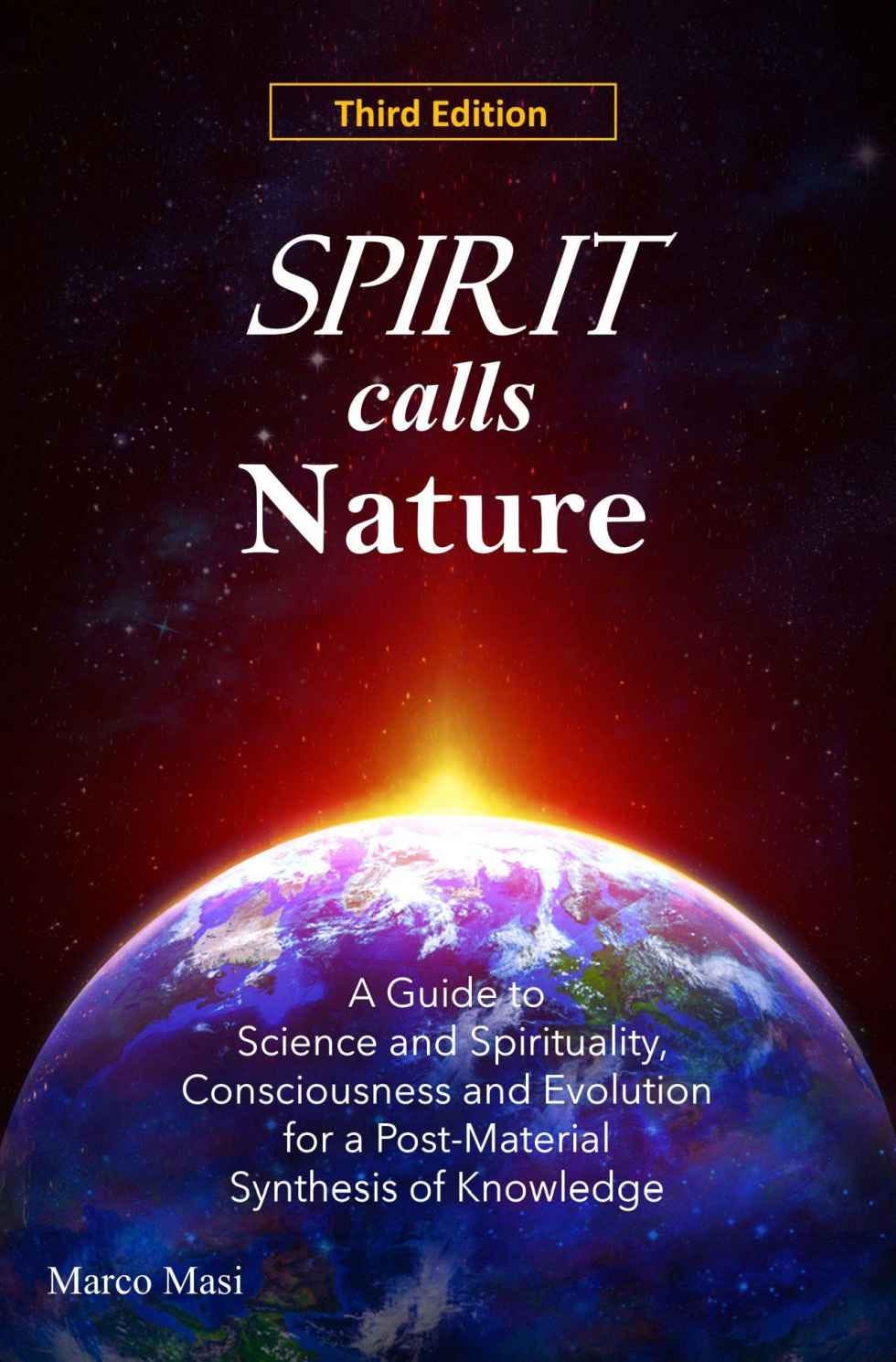Discussing the interaction problem, idealism & the origin of life...
with physicist, Marco Masi.
Some time ago while reading a post on
’s Substack I came across Marco Masi’s paper, An evidence-based critical review of the mind-brain identity theory, which made it into my elite pile of printed-out papers (old people like me fully expect the internet to just vanish into thin air any minute now). Fast forward a few months later. I’m scrolling through a comments section and I notice a good point (can’t recall it now), which I applauded. Then I get a response back and notice the name, Marco Masi. Hm, I think, where have I heard that name before?…Oh right!I am happy to inform you that the author of the paper where I first learned that it’s possible for a human being to survive with half their brain surgically removed—either half!—is also on Substack.
Also, I’m currently nearing the end of his remarkable tome, Spirit Calls Nature. At times reminiscent of Teilhard de Chardin’s The Phenomenon of Man, it offers a wealth of unique insights into the nature of scientific investigation, as well a teleological interpretation of evolution (yes!)—all in all a much needed antidote to the confused materialism of our times.
Have you ever abandoned a position that you strongly believed in? What made you change your mind?
MARCO MASI: Thank you for inviting me for an interview.
I find it interesting how this question places my ego back in its proper place. There's always a tendency to cling to one's belief system, even when evidence suggests that it would be wise to change one's perspective. I must confess that my positions on subjects I feel strongly about haven’t changed much. I probably haven't practiced the virtue of changing my mind enough.
That said, several minor beliefs have changed or taken on different nuances over time.
For example, I have always been an AI skeptic. If someone had told me about the advances in this field just a few years ago, before the advent of LLMs, I would have been dismissive, unable to believe that such a significant leap could occur in such a short time. The notion that such a remarkable form of ‘intelligence’ (whatever that may mean) could emerge solely from textual data seemed impossible to me, and I still find it mind-boggling and somewhat mysterious. Yet, here we are, and the facts can no longer be ignored. I think this tells a lot about how language reflects reality.
Nonetheless, I believe that AGI will only become feasible if it is also conscious. This is because true meaning-making is closely linked to subjective experience. Without consciousness, achieving a genuine understanding of the world—beyond simple next-token predictions and the relationships between textual data—will remain out of reach. I posit that without consciousness, there will be no AGI. It is likely that the next few years will reveal whether this is the case.
Another belief I had to give up was the seemingly all-powerful effectiveness of mathematics. I once thought that if mathematical formalism could be generalized sufficiently, it would inevitably lead to new discoveries. The idea was that by taking an existing mathematical theory and extending it into a more complex and comprehensive framework, we would automatically uncover new aspects of reality. However, I found that this is not the case; extended mathematical theories do not necessarily result in a deeper understanding of reality. There is a psychological tendency behind this belief, particularly among some scientists, especially physicists, who can easily fall in love with mathematics. This devotion is appropriate for mathematicians, as their theorems do not need to correspond to the real world. However, this can lead physicists into a dangerous labyrinth. I learned this lesson the hard way.
Are there any ideas or areas in philosophy that deserve more attention?
MARCO: The philosophy of biology. We are told that biology has dispelled metaphysical speculations about the nature of life. Life is described as an emergent property of matter, arising from a bottom-up process of biochemical reactions. There is no mystery, no vital force or 'elan vital,' and nothing particularly special beyond its immense complexity. This complexity leads me to what I term the 'complexity argument.' Every unanswered philosophical question, such as “What is the origin and nature of X?” is often met with the response: “X is merely an emergent property resulting from numerous complicated processes and functions at a lower level.” However, this response is rarely based on known and proven facts; instead, it is often an a priori assumption that is seldom questioned. We easily convince ourselves to stop probing further into this belief system because the complexity of life obscures our ability to discern its validity.
For example, when a biologist is asked, “What is life?” the answer typically revolves around genetics, biochemistry, homeostasis, reproduction, autopoiesis, and other organic or functional processes. Yet, few can articulate a coherent argument of how consciousness, feelings, emotions, cognition, will, agency, and intentionality emerged. The subjective facets of life are often overlooked, as if they do not exist within us. Paradoxically, the most significant aspect that distinguishes life from inanimate matter is ignored. I believe that psychological factors, rather than purely scientific ones, underpin this attitude. Materialism has clouded our awareness of life's subjective experiences and hindered our ability to understand ourselves.
Do you hold views that contradict the mainstream in your field? What are they, and why is the mainstream wrong?
MARCO: Well, the list of my non-mainstream views is long. It would be easier to identify which of my perspectives align with mainstream thought. After completing my PhD in physics and a brief experience in research, I left academia due to the impossibility of focusing on topics that truly interest me, which tend to be outside the mainstream.
To address your question, I can highlight one particular view.
I am not a strong supporter of large-scale scientific initiatives, often referred to as ‘big science,’ such as the Human Genome Project, large particle accelerators, and brain mapping projects. While I acknowledge that certain endeavors, like launching a space station or sending humans to the Moon or Mars, require large scale international collaborations, history suggests that scientific progress is often more effective when funding is distributed across multiple smaller research projects rather than concentrated on a single large undertaking.
Additionally, many big science projects overlook a good old wisdom: mapping the territory does not necessarily tell us what it is or guarantee an understanding of its nature and functioning. We frequently fall into the reductionist trap of believing that if we can detail every aspect down to the smallest particle, clarity will follow. However, this approach often leads to disappointing results, with findings yielding fewer practical applications than anticipated and many realizing that "things are much more complicated than expected."
If you discovered tomorrow that one of your core beliefs was fundamentally flawed, which one would be most devastating to lose?
MARCO: If the meaningless, purposeless, soulless mechanistic naturalism were to turn out to be the true description of reality, it would be quite devastating. Life would have no meaning, and we would, indeed, be only rambling biological robots. This understanding of the world has dominated since the Age of Enlightenment; on the one hand, it ignited the Industrial Revolution and contributed to the development and progress of science and technology, but on the other hand, it has had largely detrimental effects on our psychological and social well-being. I believe this materialistic worldview is one of the root causes of the contemporary crisis of meaning and has led to the environmental disaster we are witnessing. This form of naturalism is still supported by most scientists, although attitudes have begun to shift recently. It still conditions our collective mindset and, consequently, our activities. Historically, this perspective had its reasons; it was a reaction against the political power of religion and the horrors of the Inquisition, and it was necessary to achieve the secular separation of church and state. I believe it represents only a historical transition toward something much deeper and more complete. However, if physicalism were to be the final word, it would be quite disappointing. Yet this possibility does not keep me awake at night; I know it is false.
What question initially seems trivial but reveals unexpected depths when seriously examined?
MARCO: Recently, I dedicated some time to the so-called ‘interaction problem of mental causation.’ This issue fundamentally questions a naïve interpretation of Cartesian mind-body dualism. If we assume that the mind is a non-physical entity or ‘substance,’ how could it interact with a completely different physical substance, like our brain? Sounds like a reasonable objection, right? Many consider this an insurmountable challenge to dualism, favoring a physicalist interpretation of consciousness and the mind. This debate has persisted without resolution among philosophers of mind; yet, I believe it reveals much about our thinking and the unconscious premises we operate under.
First, the physical world is already filled with entities that are profoundly different yet still interact with one another. Consider, for instance, an immaterial light ray or a gravitational field interacting with a massive body. Secondly, the problem arises from a semantic misunderstanding: we assume implicitly, by definition, that something ‘unphysical’ cannot interact with material things and postulate that the mind is unphysical. Then we question how an unphysical mind could interact with a physical brain, failing to recognize that we have posited this as a premise from the outset.
The key takeaway is that the distinction between the physical and the unphysical is a made-up abstraction of the mind itself. This semantic uncertainty should motivate us to scrutinize materialism more critically and consider idealism more seriously.
What do YOU think?
Has biology dispelled metaphysical speculations about the nature of life?
Can there be AGI without meaning-making consciousness?
If light rays and gravitational fields interact with the physical, why can’t minds do the same? Is the interaction problem a problem of our own making?
MARCO MASI holds a PhD in physics from the University of Trento, Italy. He has worked as a postdoc researcher in universities in Italy, France, and, more recently, Germany, where he also worked as a schoolteacher for three years and where he presently lives. After this academic experience, his interests veered toward the foundations of physics and the philosophy of mind.
Check out his website
Follow him on Bluesky
And right here on Substack:
You can customize which bits of this newsletter you receive by visiting your account.
To get full access to my published books and posts, upgrade your subscription. Find out more.
Thanks for supporting my literary endeavors and off-beat philosophical speculations. Cheers!
—Tina










